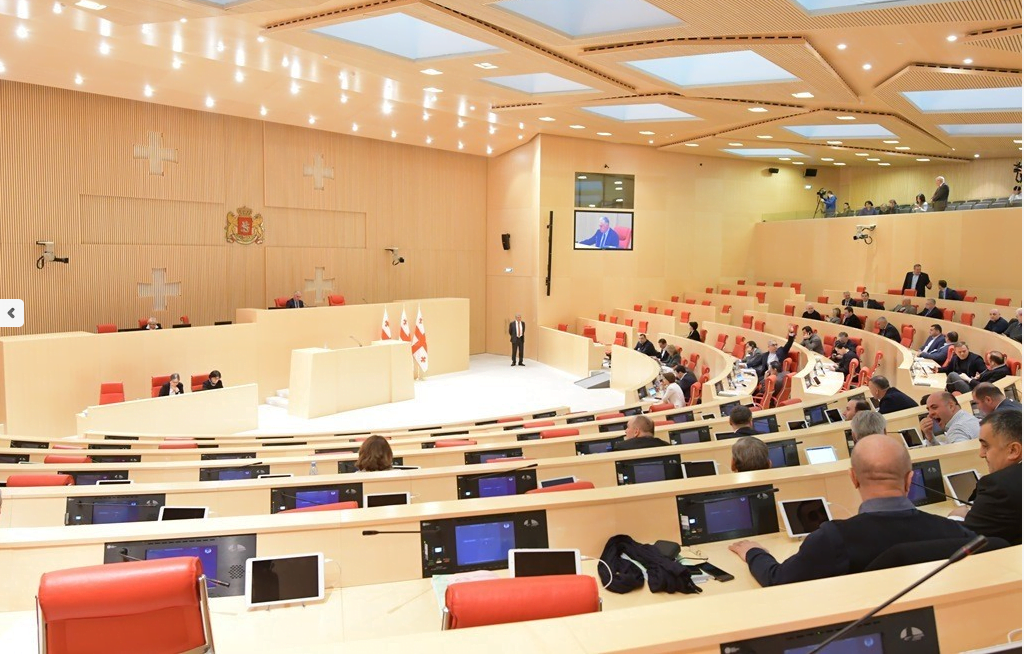
Parliament Endorses New Rules of Procedure
On December 6, the Parliament of Georgia endorsed with 77 votes in favor and two against its new Rules of Procedure. The document is in line with the new Constitution, which is to enter into force upon President-elect Salome Zurabishvili’s inauguration on December 16.
MPs from the European Georgia, the United National Movement and the Alliance of Patriots did not participate in the process. Two Georgian Dream lawmakers voted against.
According to the explanatory note of the new Rules of Procedure, the key objective of the document is “to form the Parliament into a strong institution characteristic for parliamentary system of governance.”
“The current Rules of Procedure have demonstrated a number of shortcomings in terms of legislative and oversight processes; the norms are tailored to rapid law-making that fails to ensure high quality work of the Parliament,” reads the explanatory note.
Upgraded oversight function
Like the previous one, the new Rules of Procedure document sets out regulations for the work of the legislature and its bodies, as well as its relations with other branches of government. According to the explanatory note, one of the main purposes of the new Rules of Procedures is to strengthen the Parliament’s oversight function, especially in fields of defense and security.
Seat in Kutaisi
Under the new Rules of Procedure, Kutaisi will no longer be the parliamentary seat, and both – plenary and committee hearings – will be held in the Parliament building in Tbilisi. The legislature will be able to hold sittings outside Tbilisi in cases when the seat of the Parliament can not function, such as under the martial law or in a state of emergency. In these cases, the Chairperson of the Parliament can call the session at another location.
The Cabinet reports differently
Under the new regulations, the Prime Minister has to present an annual report on implementation of the government program during the last month of plenary sittings of the Spring Session, in June.
The Parliament, at the request of a committee or a faction, will be able to summon government members and other officials accountable to the legislature (prosecutor general, head of the state security service) to plenary sittings with a majority vote, but with no less than 1/3 of the Parliament members, instead of the previous 1/5.
A group of no less than seven lawmakers (down from the previous ten) will have the right to address the Government of Georgia and other agencies accountable to the Parliament with a written question. The addressee will have to appear before the Parliament to give its response (four times a year – in March, May, September, November).
A parliamentary committee enjoys the right to summon officials as well. An official can be invited to committee hearings by majority of its members or an individual faction. The latter has the right to invite officials only if it has a member sitting in the committee. Opposition criticizes this provision, saying it limits the functions of the parliamentary factions.
Debates rules also changed
There are new rules for holding political debates. If previously, fractions, majority and minority groups had the right to request political debates, the debates will now have to be requested by at least 1/5 of the Parliament members.
The Parliament’s new Rules of Procedure will enter into force from January 1, 2019.
Political assessments: opposition says its role curbed
Deputy Parliament Speaker Tamar Chugoshvili, who authored the document, said the new rules of procedure will make the legislative process “more dynamic and more interesting.” “We expect more frequent visits of government officials to the Parliament, as well as a significantly improved lawmaking process,” the Deputy Speaker noted.
Hopes for the new document are lower in the opposition.
MP Sergi Kapanadze of the European Georgia said under the new regulations, “opposition and parliamentary factions will no longer be able to summon ministers.” “The new document has actually left the opposition functionless; it deprived us of the opportunity to ask normal questions and enter into discussion with government members,” he told Civil.ge.
Kapanadze added that the ruling party rejected the idea of political debates and did not take the opposition’s recommendations into consideration. “In these circumstances, it would not be right to attend the sitting and create an illusion of participation [in the discussions]… They have actually tailored the Rules of Procedure to themselves,” he added.
MP Roman Gotsiridze of the United National Movement stressed some articles of the new Rules of Procedure, including on inviting ministers to the Parliament, could be assessed positively, but at the same time there are “worsened” provisions, including the one on removing the right of parliamentary factions to summon ministers.
“The role of parliamentary factions as part of the political system has been diminished, and this has also diminished the role of the opposition; only committees will now be able to summon ministers and if the opposition does not have enough members in the committees, it means only the majority group will enjoy this right,” the lawmaker told Civil.ge.
“So, it turns out that they are creating favorable conditions for the government by avoiding hard questions from the opposition,” Gotsiridze added.
This post is also available in: ქართული Русский